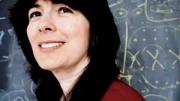When Joanna Aizenberg looks at the skeleton of a sea sponge lying on her desk, she sees more than an oddly shaped tube. “The sponge makes this nearly perfect glass structure,” she says. “Almost every construction principle that we use is used by nature here, but on a scale 1,000 times smaller.” Aizenberg, who is Gordon McKay professor of materials science and Susan S. and Kenneth L. Wallach professor at the Radcliffe Institute, where she will be a fellow this fall, puts the design principles she sees in nature—in sponges, rocks, and sea urchins—to human ends. For instance, the brittle star (a relative of the starfish) can change the pigment of its crystal optical lens like a pair of light-sensitive sunglasses. By mimicking its design, Aizenberg invented a synthetic lens that she could tune to certain wavelengths of light. Her research draws on chemistry, biology, engineering, and math, the last of which she has excelled at since childhood. While growing up in Russia, she won mathematical Olympiads and precociously sent problems of her own devising to a popular science magazine. Unfortunately, the Russian educational system discouraged exploration beyond her chosen field of physical chemistry. She found more freedom while earning her Ph.D. in structural biology at the Weizmann Institute of Science in Israel—where her fascination with crystalline structures in sea life began—and as a postdoctoral student at Harvard. She returned to Harvard in 2007 after several years at Bell Labs, where working with students serving summer fellowships convinced her that she wanted to teach full time. She has also lectured at the New York School of Design, where she tells students that they can find everything they study in nature. Even in a sea sponge.
Joanna Aizenberg
Joanna Aizenberg
A bioengineer learns from sponges...

You might also like
Are “Little Red Dots” Keys to Understanding the Early Universe?
Harvard-Smithsonian astrophysicist Fabio Pacucci explains one of cosmology’s newest mysteries
Bees and Flowers Are Falling Out of Sync
Scientists are revisiting an old way of thinking about extinction.
The Enterprise Research Campus in Allston Nears Completion
A hotel, restaurants, and other retail establishments are open or on the way.
Most popular
Explore More From Current Issue

Rabbi, Drag Queen, Film Star
Sabbath Queen, a new documentary, follows one man’s quest to make Judaism more expansive.







